Hexagramme 51 du Yi Jing - Trait 4
L'hexagramme : 51
Un hexagramme est une combinaison de six traits yin et yang.
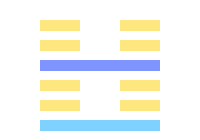
51.4 (51 > 24) - THE KĂN HEXAGRAM.
The fourth line, undivided, shows its subject, amid the startling movements, supinely sinking (deeper) in the mud.
Bing DeepL Google Yandex51.4 (51 > 24) - Being bogged down
One has to free oneself from others before one can go any further.
Bing DeepL Google Yandex51.4 (51 > 24) - Being bogged down
One has to free oneself from others before one can go any further.
Bing DeepL Google Yandex51.4 (51 > 24) - Kán, l’ébranlement
Kán : tonnerre, effroi répandu, crainte.
Le tonnerre approchant trouble et interdit [avant même l’éclair].
Bing DeepL Google Yandex51.4 (51 > 24) - Être embourbé
On doit se libérer des autres avant de pouvoir aller plus loin.
Bing DeepL Google Yandex51.4 (51 > 24) - Megrázkódtatás
Meg kell szabadítania magát a többiektől mielőtt tovább mehetne.
Bing DeepL Google YandexLes trigrammes
Les trigrammes sont des combinaisons de trois traits yin et yang. Dans l'hexagramme, les trois traits du dessous constituent le trigramme inférieur et représentent la situation intérieure. Les trois lignes du haut constituent le trigramme supérieur et représentent la situation extérieure.
trigSup2


trigInf

L'hexagramme nucléaire : 39.3.5 (39 > 2)
L'hexagramme nucléaire est l'association des deux trigrammes intérieurs (traits 2,3,4 et 3,4,5). Il représente la racine, ou l'origine de la situation.
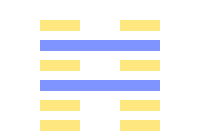
39.3.5 (39 > 2) - THE KIEN HEXAGRAM.
- 3. The third line, undivided, shows its subject advancing, (but only) to (greater) difficulties. He remains stationary, and returns (to his former associates).
- 5. The fifth line, undivided, shows its subject struggling with the greatest difficulties, while friends are coming to help him.
39.3.5 (39 > 2) - Taking a step back in order to move forward
One organises oneself to work around the blockages.
Bing DeepL Google Yandex39.3.5 (39 > 2) - Taking a step back in order to move forward
One organizes oneself to work around the blockages.
Bing DeepL Google Yandex39.3.5 (39 > 2) - Kién, l’obstacle
Kién : Difficulté, danger, noble hardiesse.
- 3. L’un va aux difficultés et revient après au repos. Ou : qui va aux difficultés (courageusement) revient aux profits (en obtient).
- 5. C’est dans les difficultés que les amis se montrent.
39.3.5 (39 > 2) - Reculer pour mieux sauter
On s’organise pour contourner les blocages.
Bing DeepL Google Yandex39.3.5 (39 > 2) - Bizonytalanság
- 3. Azt akarják hogy visszajöjjön.
- 5. Problémák amiket nem oldhat meg egyedül, látogatókat kap amikor szükség van rájuk.
Le dérivé (Fan Yao) : 24.4
Le même trait sur l'hexagramme après la mutation. Il représente ce qui peut être fait APRÈS pour corriger la situation décrite par ce trait, un peu comme un remède ou une solution.
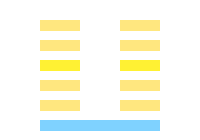
24.4 (24 > 51) - THE FÛ HEXAGRAM.
The fourth line, divided, shows its subject moving right in the centre (among those represented by the other divided lines), and yet returning alone (to his proper path).
Bing DeepL Google Yandex24.4 (24 > 51) - Freeing oneself from discomfort
One sees that others exaggerate, so one moves away.
Bing DeepL Google Yandex24.4 (24 > 51) - Freeing oneself from discomfort
One sees that others exaggerate, so one moves away.
Bing DeepL Google Yandex24.4 (24 > 51) - Fû, le retour
Fū : réparation, correction, amendement, retour à l’état originaire
Celui qui suit le chemin du juste milieu est le seul qui sache restaurer sa nature.
Il suit la droite raison.
24.4 (24 > 51) - Se libérer de l'inconfort
On voit que les autres exagèrent, alors on s'éloigne.
Bing DeepL Google YandexLa jointure: 23.3
Le dérivé du réciproque. Il représente ce qui aurait pu être fait AVANT pour prévenir la situation décrite par ce trait, un peu comme un remède ou une solution.

23.3 (23 > 52) - THE PO HEXAGRAM
The third line, divided, shows its subject among the overthrowers; but there will be no error.
Bing DeepL Google Yandex23.3 (23 > 52) - Poh, l’écroulement
Poh : opprimer, renverser, traiter durement.
Renverser, faire crouler quelque chose sans suite regrettable. C’est quand on le fait légitimement et pour bonnes raisons. C’est que cela atteint également grands et petits (ou abandonne).
Bing DeepL Google YandexLe réciproque : 52.3
L'hexagramme renversé. Il représente la situation opposée, et en tant que tel est essentiel pour la validation des commentaires.

52.3 (52 > 23) - THE KĂN HEXAGRAM.
The third line, undivided, shows its subject keeping his loins at rest, and separating the ribs (from the body below). The situation is perilous, and the heart glows with suppressed excitement.
Bing DeepL Google Yandex52.3 (52 > 23) - Losing blood
One asks the most capable when others don't answer.
Bing DeepL Google Yandex52.3 (52 > 23) - Losing blood
One asks the most capable when others don't answer.
Bing DeepL Google Yandex52.3 (52 > 23) - Kán, l’arrêt
Kán : ferme, tenir droit, bien réglé, arrêter, reposer
Se tenir ferme à sa place et le corps (litt. : les côtes) bien tenu, (c’est ainsi que l’on doit être).
Bing DeepL Google Yandex52.3 (52 > 23) - Perdre son sang
On demande aux plus capables quand les autres ne répondent pas.
Bing DeepL Google Yandex52.3 (52 > 23) - Megállás
A legalkalmasabbat kéri ha mások nem válaszolnak.
Bing DeepL Google YandexMutations

51.4 (51 > 24) - THE KĂN HEXAGRAM.
The fourth line, undivided, shows its subject, amid the startling movements, supinely sinking (deeper) in the mud.
Bing DeepL Google Yandex51.4 (51 > 24) - Being bogged down
One has to free oneself from others before one can go any further.
Bing DeepL Google Yandex51.4 (51 > 24) - Being bogged down
One has to free oneself from others before one can go any further.
Bing DeepL Google Yandex51.4 (51 > 24) - Kán, l’ébranlement
Kán : tonnerre, effroi répandu, crainte.
Le tonnerre approchant trouble et interdit [avant même l’éclair].
Bing DeepL Google Yandex51.4 (51 > 24) - Être embourbé
On doit se libérer des autres avant de pouvoir aller plus loin.
Bing DeepL Google Yandex51.4 (51 > 24) - Megrázkódtatás
Meg kell szabadítania magát a többiektől mielőtt tovább mehetne.
Bing DeepL Google Yandex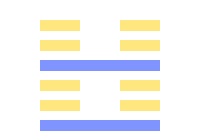
51.1.4 (51 > 2) - THE KĂN HEXAGRAM.
- 1. The first line, undivided, shows its subject, when the movement approaches, looking out and around with apprehension, and afterwards smiling and talking cheerfully. There will be good fortune.
- 4. The fourth line, undivided, shows its subject, amid the startling movements, supinely sinking (deeper) in the mud.
51.1.4 (51 > 2) - Losing sight of the general interest
One takes care of the essential instead of disturbing others by seeking to innovate.
Bing DeepL Google Yandex51.1.4 (51 > 2) - Losing sight of the general interest
One takes care of the essential instead of disturbing others by seeking to innovate.
Bing DeepL Google Yandex51.1.4 (51 > 2) - Kán, l’ébranlement
Kán : tonnerre, effroi répandu, crainte.
- 1. Le tonnerre approchant, on est plein d’effroi ; puis, quand il est passé, on sourit et on parle tous ensemble (on passe de la crainte à la joie).
- 4. Le tonnerre approchant trouble et interdit [avant même l’éclair].
51.1.4 (51 > 2) - Ne pas perdre de vue l’intérêt général
On s’occupe de l’essentiel au lieu de déranger les autres en cherchant à innover.
Bing DeepL Google Yandex51.1.4 (51 > 2) - Megrázkódtatás
- 1. Nevethet miután meglátja.
- 4. Meg kell szabadítania magát a többiektől mielőtt tovább mehetne.
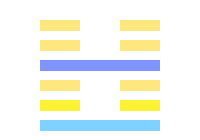
51.2.4 (51 > 19) - THE KĂN HEXAGRAM.
- 2. The second line, divided, shows its subject, when the movement approaches, in a position of peril. He judges it better to let go the articles (in his possession), and to ascend a very lofty height. There is no occasion for him to pursue after (the things he has let go) ; in seven days he will find them.
- 4. The fourth line, undivided, shows its subject, amid the startling movements, supinely sinking (deeper) in the mud.
51.2.4 (51 > 19) - Shock
One complains of a strange clumsiness that seemed to have been prepared beforehand.
Bing DeepL Google Yandex51.2.4 (51 > 19) - Shock
One complains of a strange clumsiness that seemed to have been prepared beforehand.
Bing DeepL Google Yandex51.2.4 (51 > 19) - Kán, l’ébranlement
Kán : tonnerre, effroi répandu, crainte.
- 2. Quand le tonnerre gronde, le danger arrive, on croit devoir tout abandonner et se retirer en un lieu sûr et élevé. Qu’on ne s’obstine pas à rechercher alors ce qu’on a abandonné ; on le retrouvera quelque temps après. (Quand le danger sera passé.)
- 4. Le tonnerre approchant trouble et interdit [avant même l’éclair].
51.2.4 (51 > 19) - Le choc
On se plaint d'une étrange maladresse qui semblait avoir été préparée à l'avance.
Bing DeepL Google Yandex51.2.4 (51 > 19) - Megrázkódtatás
- 2. Ne keresse ami elveszett.
- 4. Meg kell szabadítania magát a többiektől mielőtt tovább mehetne.
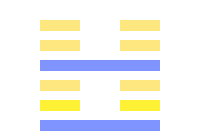
51.1.2.4 (51 > 7) - THE KĂN HEXAGRAM.
- 1. The first line, undivided, shows its subject, when the movement approaches, looking out and around with apprehension, and afterwards smiling and talking cheerfully. There will be good fortune.
- 2. The second line, divided, shows its subject, when the movement approaches, in a position of peril. He judges it better to let go the articles (in his possession), and to ascend a very lofty height. There is no occasion for him to pursue after (the things he has let go) ; in seven days he will find them.
- 4. The fourth line, undivided, shows its subject, amid the startling movements, supinely sinking (deeper) in the mud.
51.1.2.4 (51 > 7) - Kán, l’ébranlement
Kán : tonnerre, effroi répandu, crainte.
- 1. Le tonnerre approchant, on est plein d’effroi ; puis, quand il est passé, on sourit et on parle tous ensemble (on passe de la crainte à la joie).
- 2. Quand le tonnerre gronde, le danger arrive, on croit devoir tout abandonner et se retirer en un lieu sûr et élevé. Qu’on ne s’obstine pas à rechercher alors ce qu’on a abandonné ; on le retrouvera quelque temps après. (Quand le danger sera passé.)
- 4. Le tonnerre approchant trouble et interdit [avant même l’éclair].
51.1.2.4 (51 > 7) - Le choc
On peut dire ce qu'on veut à ceux que l'on agresse.
Bing DeepL Google Yandex51.1.2.4 (51 > 7) - Megrázkódtatás
- 1. Nevethet miután meglátja.
- 2. Ne keresse ami elveszett.
- 4. Meg kell szabadítania magát a többiektől mielőtt tovább mehetne.
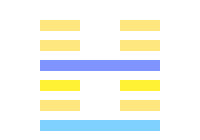
51.3.4 (51 > 36) - THE KĂN HEXAGRAM.
- 3. The third line, divided, shows its subject distraught amid the startling movements going on. If those movements excite him to (right) action, there will be no mistake.
- 4. The fourth line, undivided, shows its subject, amid the startling movements, supinely sinking (deeper) in the mud.
51.3.4 (51 > 36) - Shock
One returns to surprise those who thought one had disappeared.
Bing DeepL Google Yandex51.3.4 (51 > 36) - Shock
One returns to surprise those who thought one had disappeared.
Bing DeepL Google Yandex51.3.4 (51 > 36) - Kán, l’ébranlement
Kán : tonnerre, effroi répandu, crainte.
- 3. Le tonnerre émeut, agite ; il pousse à agir justement.
- 4. Le tonnerre approchant trouble et interdit [avant même l’éclair].
51.3.4 (51 > 36) - Le choc
On revient pour faire une surprise à ceux qui croyaient que l'on avait disparu.
Bing DeepL Google Yandex51.3.4 (51 > 36) - Megrázkódtatás
- 3. Meglátva a szakadást otthagyja őket.
- 4. Meg kell szabadítania magát a többiektől mielőtt tovább mehetne.
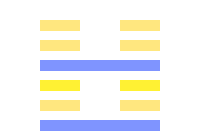
51.1.3.4 (51 > 15) - THE KĂN HEXAGRAM.
- 1. The first line, undivided, shows its subject, when the movement approaches, looking out and around with apprehension, and afterwards smiling and talking cheerfully. There will be good fortune.
- 3. The third line, divided, shows its subject distraught amid the startling movements going on. If those movements excite him to (right) action, there will be no mistake.
- 4. The fourth line, undivided, shows its subject, amid the startling movements, supinely sinking (deeper) in the mud.
51.1.3.4 (51 > 15) - Shock
One has claimed to be aware of facts that never happened.
Bing DeepL Google Yandex51.1.3.4 (51 > 15) - Shock
One has claimed to be aware of facts that never happened.
Bing DeepL Google Yandex51.1.3.4 (51 > 15) - Kán, l’ébranlement
Kán : tonnerre, effroi répandu, crainte.
- 1. Le tonnerre approchant, on est plein d’effroi ; puis, quand il est passé, on sourit et on parle tous ensemble (on passe de la crainte à la joie).
- 3. Le tonnerre émeut, agite ; il pousse à agir justement.
- 4. Le tonnerre approchant trouble et interdit [avant même l’éclair].
51.1.3.4 (51 > 15) - Le choc
On a prétendu être au courant de faits qui ne se sont jamais produits.
Bing DeepL Google Yandex51.1.3.4 (51 > 15) - Megrázkódtatás
- 1. Nevethet miután meglátja.
- 3. Meglátva a szakadást otthagyja őket.
- 4. Meg kell szabadítania magát a többiektől mielőtt tovább mehetne.
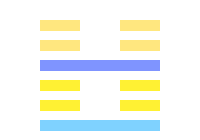
51.2.3.4 (51 > 11) - THE KĂN HEXAGRAM.
- 2. The second line, divided, shows its subject, when the movement approaches, in a position of peril. He judges it better to let go the articles (in his possession), and to ascend a very lofty height. There is no occasion for him to pursue after (the things he has let go) ; in seven days he will find them.
- 3. The third line, divided, shows its subject distraught amid the startling movements going on. If those movements excite him to (right) action, there will be no mistake.
- 4. The fourth line, undivided, shows its subject, amid the startling movements, supinely sinking (deeper) in the mud.
51.2.3.4 (51 > 11) - Shock
One is hard hit by the amount of work one has had to face.
Bing DeepL Google Yandex51.2.3.4 (51 > 11) - Shock
One is hard hit by the amount of work one has had to face.
Bing DeepL Google Yandex51.2.3.4 (51 > 11) - Kán, l’ébranlement
Kán : tonnerre, effroi répandu, crainte.
- 2. Quand le tonnerre gronde, le danger arrive, on croit devoir tout abandonner et se retirer en un lieu sûr et élevé. Qu’on ne s’obstine pas à rechercher alors ce qu’on a abandonné ; on le retrouvera quelque temps après. (Quand le danger sera passé.)
- 3. Le tonnerre émeut, agite ; il pousse à agir justement.
- 4. Le tonnerre approchant trouble et interdit [avant même l’éclair].
51.2.3.4 (51 > 11) - Le choc
On est éprouvé par la somme de travail que l'on a dû affronter.
Bing DeepL Google Yandex51.2.3.4 (51 > 11) - Megrázkódtatás
- 2. Ne keresse ami elveszett.
- 3. Meglátva a szakadást otthagyja őket.
- 4. Meg kell szabadítania magát a többiektől mielőtt tovább mehetne.
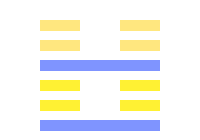
51.1.2.3.4 (51 > 46) - THE KĂN HEXAGRAM.
- 1. The first line, undivided, shows its subject, when the movement approaches, looking out and around with apprehension, and afterwards smiling and talking cheerfully. There will be good fortune.
- 2. The second line, divided, shows its subject, when the movement approaches, in a position of peril. He judges it better to let go the articles (in his possession), and to ascend a very lofty height. There is no occasion for him to pursue after (the things he has let go) ; in seven days he will find them.
- 3. The third line, divided, shows its subject distraught amid the startling movements going on. If those movements excite him to (right) action, there will be no mistake.
- 4. The fourth line, undivided, shows its subject, amid the startling movements, supinely sinking (deeper) in the mud.
51.1.2.3.4 (51 > 46) - Shock
One gets enthusiastic, so one proves right to those who reveal intimate details.
Bing DeepL Google Yandex51.1.2.3.4 (51 > 46) - Shock
One gets enthusiastic, so one proves right to those who reveal intimate details.
Bing DeepL Google Yandex51.1.2.3.4 (51 > 46) - Kán, l’ébranlement
Kán : tonnerre, effroi répandu, crainte.
- 1. Le tonnerre approchant, on est plein d’effroi ; puis, quand il est passé, on sourit et on parle tous ensemble (on passe de la crainte à la joie).
- 2. Quand le tonnerre gronde, le danger arrive, on croit devoir tout abandonner et se retirer en un lieu sûr et élevé. Qu’on ne s’obstine pas à rechercher alors ce qu’on a abandonné ; on le retrouvera quelque temps après. (Quand le danger sera passé.)
- 3. Le tonnerre émeut, agite ; il pousse à agir justement.
- 4. Le tonnerre approchant trouble et interdit [avant même l’éclair].
51.1.2.3.4 (51 > 46) - Le choc
On s'enthousiasme alors on donne raison à ceux qui dévoilent des détails intimes.
Bing DeepL Google Yandex51.1.2.3.4 (51 > 46) - Megrázkódtatás
- 1. Nevethet miután meglátja.
- 2. Ne keresse ami elveszett.
- 3. Meglátva a szakadást otthagyja őket.
- 4. Meg kell szabadítania magát a többiektől mielőtt tovább mehetne.
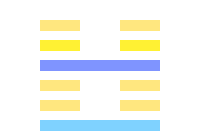
51.4.5 (51 > 3) - THE KĂN HEXAGRAM.
- 4. The fourth line, undivided, shows its subject, amid the startling movements, supinely sinking (deeper) in the mud.
- 5. The fifth line, divided, shows its subject going and coming amidst the startling movements (of the time), and always in peril ; but perhaps he will not incur loss, and find business (which he can accomplish).
51.4.5 (51 > 3) - Shock
One tries to follow the instinct of one' s predecessors in order to be able to do like them.
Bing DeepL Google Yandex51.4.5 (51 > 3) - Shock
One tries to follow the instinct of one' s predecessors in order to be able to do like them.
Bing DeepL Google Yandex51.4.5 (51 > 3) - Kán, l’ébranlement
Kán : tonnerre, effroi répandu, crainte.
- 4. Le tonnerre approchant trouble et interdit [avant même l’éclair].
- 5. Le tonnerre allant et venant répand l’effroi ; mais on doit tâcher de ne pas abandonner les affaires entreprises. Même dans le danger pressant, on doit garder le milieu.
51.4.5 (51 > 3) - Le choc
On cherche à suivre l'instinct de ses prédécesseurs afin de pouvoir faire comme eux.
Bing DeepL Google Yandex51.4.5 (51 > 3) - Megrázkódtatás
- 4. Meg kell szabadítania magát a többiektől mielőtt tovább mehetne.
- 5. Szilárdan áll a megrázkódtatás kezdetekor és végigkíséri a többieket míg véget nem ér.
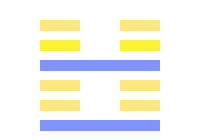
51.1.4.5 (51 > 8) - THE KĂN HEXAGRAM.
- 1. The first line, undivided, shows its subject, when the movement approaches, looking out and around with apprehension, and afterwards smiling and talking cheerfully. There will be good fortune.
- 4. The fourth line, undivided, shows its subject, amid the startling movements, supinely sinking (deeper) in the mud.
- 5. The fifth line, divided, shows its subject going and coming amidst the startling movements (of the time), and always in peril ; but perhaps he will not incur loss, and find business (which he can accomplish).
51.1.4.5 (51 > 8) - Shock
One thinks to be in a better position than those who claim they can win.
Bing DeepL Google Yandex51.1.4.5 (51 > 8) - Shock
One thinks to be in a better position than those who claim they can win.
Bing DeepL Google Yandex51.1.4.5 (51 > 8) - Kán, l’ébranlement
Kán : tonnerre, effroi répandu, crainte.
- 1. Le tonnerre approchant, on est plein d’effroi ; puis, quand il est passé, on sourit et on parle tous ensemble (on passe de la crainte à la joie).
- 4. Le tonnerre approchant trouble et interdit [avant même l’éclair].
- 5. Le tonnerre allant et venant répand l’effroi ; mais on doit tâcher de ne pas abandonner les affaires entreprises. Même dans le danger pressant, on doit garder le milieu.
51.1.4.5 (51 > 8) - Le choc
On se pense mieux placé que ceux qui prétendent pouvoir l'emporter.
Bing DeepL Google Yandex51.1.4.5 (51 > 8) - Megrázkódtatás
- 1. Nevethet miután meglátja.
- 4. Meg kell szabadítania magát a többiektől mielőtt tovább mehetne.
- 5. Szilárdan áll a megrázkódtatás kezdetekor és végigkíséri a többieket míg véget nem ér.
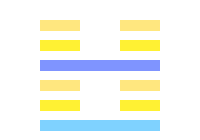
51.2.4.5 (51 > 60) - THE KĂN HEXAGRAM.
- 2. The second line, divided, shows its subject, when the movement approaches, in a position of peril. He judges it better to let go the articles (in his possession), and to ascend a very lofty height. There is no occasion for him to pursue after (the things he has let go) ; in seven days he will find them.
- 4. The fourth line, undivided, shows its subject, amid the startling movements, supinely sinking (deeper) in the mud.
- 5. The fifth line, divided, shows its subject going and coming amidst the startling movements (of the time), and always in peril ; but perhaps he will not incur loss, and find business (which he can accomplish).
51.2.4.5 (51 > 60) - Shock
One talks to another again after a long period of silence.
Bing DeepL Google Yandex51.2.4.5 (51 > 60) - Shock
One talks to another again after a long period of silence.
Bing DeepL Google Yandex51.2.4.5 (51 > 60) - Kán, l’ébranlement
Kán : tonnerre, effroi répandu, crainte.
- 2. Quand le tonnerre gronde, le danger arrive, on croit devoir tout abandonner et se retirer en un lieu sûr et élevé. Qu’on ne s’obstine pas à rechercher alors ce qu’on a abandonné ; on le retrouvera quelque temps après. (Quand le danger sera passé.)
- 4. Le tonnerre approchant trouble et interdit [avant même l’éclair].
- 5. Le tonnerre allant et venant répand l’effroi ; mais on doit tâcher de ne pas abandonner les affaires entreprises. Même dans le danger pressant, on doit garder le milieu.
51.2.4.5 (51 > 60) - Le choc
On se parle à nouveau après une longue période de silence.
Bing DeepL Google Yandex51.2.4.5 (51 > 60) - Megrázkódtatás
- 2. Ne keresse ami elveszett.
- 4. Meg kell szabadítania magát a többiektől mielőtt tovább mehetne.
- 5. Szilárdan áll a megrázkódtatás kezdetekor és végigkíséri a többieket míg véget nem ér.
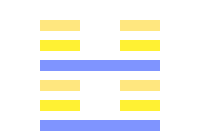
51.1.2.4.5 (51 > 29) - THE KĂN HEXAGRAM.
- 1. The first line, undivided, shows its subject, when the movement approaches, looking out and around with apprehension, and afterwards smiling and talking cheerfully. There will be good fortune.
- 2. The second line, divided, shows its subject, when the movement approaches, in a position of peril. He judges it better to let go the articles (in his possession), and to ascend a very lofty height. There is no occasion for him to pursue after (the things he has let go) ; in seven days he will find them.
- 4. The fourth line, undivided, shows its subject, amid the startling movements, supinely sinking (deeper) in the mud.
- 5. The fifth line, divided, shows its subject going and coming amidst the startling movements (of the time), and always in peril ; but perhaps he will not incur loss, and find business (which he can accomplish).
51.1.2.4.5 (51 > 29) - Shock
One goes straight ahead so as not to be tempted by the distractions that others offer.
Bing DeepL Google Yandex51.1.2.4.5 (51 > 29) - Shock
One goes straight ahead so as not to be tempted by the distractions that others offer.
Bing DeepL Google Yandex51.1.2.4.5 (51 > 29) - Kán, l’ébranlement
Kán : tonnerre, effroi répandu, crainte.
- 1. Le tonnerre approchant, on est plein d’effroi ; puis, quand il est passé, on sourit et on parle tous ensemble (on passe de la crainte à la joie).
- 2. Quand le tonnerre gronde, le danger arrive, on croit devoir tout abandonner et se retirer en un lieu sûr et élevé. Qu’on ne s’obstine pas à rechercher alors ce qu’on a abandonné ; on le retrouvera quelque temps après. (Quand le danger sera passé.)
- 4. Le tonnerre approchant trouble et interdit [avant même l’éclair].
- 5. Le tonnerre allant et venant répand l’effroi ; mais on doit tâcher de ne pas abandonner les affaires entreprises. Même dans le danger pressant, on doit garder le milieu.
51.1.2.4.5 (51 > 29) - Le choc
On va tout droit pour ne pas être tenté par les distractions que les autres proposent.
Bing DeepL Google Yandex51.1.2.4.5 (51 > 29) - Megrázkódtatás
- 1. Nevethet miután meglátja.
- 2. Ne keresse ami elveszett.
- 4. Meg kell szabadítania magát a többiektől mielőtt tovább mehetne.
- 5. Szilárdan áll a megrázkódtatás kezdetekor és végigkíséri a többieket míg véget nem ér.
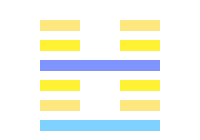
51.3.4.5 (51 > 63) - THE KĂN HEXAGRAM.
- 3. The third line, divided, shows its subject distraught amid the startling movements going on. If those movements excite him to (right) action, there will be no mistake.
- 4. The fourth line, undivided, shows its subject, amid the startling movements, supinely sinking (deeper) in the mud.
- 5. The fifth line, divided, shows its subject going and coming amidst the startling movements (of the time), and always in peril ; but perhaps he will not incur loss, and find business (which he can accomplish).
51.3.4.5 (51 > 63) - Shock
One makes more effort than necessary because one came here to let off some steam.
Bing DeepL Google Yandex51.3.4.5 (51 > 63) - Shock
One makes more effort than necessary because one came here to let off some steam.
Bing DeepL Google Yandex51.3.4.5 (51 > 63) - Kán, l’ébranlement
Kán : tonnerre, effroi répandu, crainte.
- 3. Le tonnerre émeut, agite ; il pousse à agir justement.
- 4. Le tonnerre approchant trouble et interdit [avant même l’éclair].
- 5. Le tonnerre allant et venant répand l’effroi ; mais on doit tâcher de ne pas abandonner les affaires entreprises. Même dans le danger pressant, on doit garder le milieu.
51.3.4.5 (51 > 63) - Le choc
On fait plus d'efforts que nécessaire car on est venu pour se défouler.
Bing DeepL Google Yandex51.3.4.5 (51 > 63) - Megrázkódtatás
- 3. Meglátva a szakadást otthagyja őket.
- 4. Meg kell szabadítania magát a többiektől mielőtt tovább mehetne.
- 5. Szilárdan áll a megrázkódtatás kezdetekor és végigkíséri a többieket míg véget nem ér.
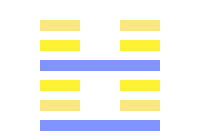
51.1.3.4.5 (51 > 39) - THE KĂN HEXAGRAM.
- 1. The first line, undivided, shows its subject, when the movement approaches, looking out and around with apprehension, and afterwards smiling and talking cheerfully. There will be good fortune.
- 3. The third line, divided, shows its subject distraught amid the startling movements going on. If those movements excite him to (right) action, there will be no mistake.
- 4. The fourth line, undivided, shows its subject, amid the startling movements, supinely sinking (deeper) in the mud.
- 5. The fifth line, divided, shows its subject going and coming amidst the startling movements (of the time), and always in peril ; but perhaps he will not incur loss, and find business (which he can accomplish).
51.1.3.4.5 (51 > 39) - Shock
One returns empty-handed because one didn't understand what means to use.
Bing DeepL Google Yandex51.1.3.4.5 (51 > 39) - Shock
One returns empty-handed because one didn't understand what means to use.
Bing DeepL Google Yandex51.1.3.4.5 (51 > 39) - Kán, l’ébranlement
Kán : tonnerre, effroi répandu, crainte.
- 1. Le tonnerre approchant, on est plein d’effroi ; puis, quand il est passé, on sourit et on parle tous ensemble (on passe de la crainte à la joie).
- 3. Le tonnerre émeut, agite ; il pousse à agir justement.
- 4. Le tonnerre approchant trouble et interdit [avant même l’éclair].
- 5. Le tonnerre allant et venant répand l’effroi ; mais on doit tâcher de ne pas abandonner les affaires entreprises. Même dans le danger pressant, on doit garder le milieu.
51.1.3.4.5 (51 > 39) - Le choc
On rentre bredouille car on n'a pas compris quels moyens il fallait employer.
Bing DeepL Google Yandex51.1.3.4.5 (51 > 39) - Megrázkódtatás
- 1. Nevethet miután meglátja.
- 3. Meglátva a szakadást otthagyja őket.
- 4. Meg kell szabadítania magát a többiektől mielőtt tovább mehetne.
- 5. Szilárdan áll a megrázkódtatás kezdetekor és végigkíséri a többieket míg véget nem ér.
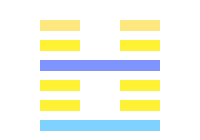
51.2.3.4.5 (51 > 5) - THE KĂN HEXAGRAM.
- 2. The second line, divided, shows its subject, when the movement approaches, in a position of peril. He judges it better to let go the articles (in his possession), and to ascend a very lofty height. There is no occasion for him to pursue after (the things he has let go) ; in seven days he will find them.
- 3. The third line, divided, shows its subject distraught amid the startling movements going on. If those movements excite him to (right) action, there will be no mistake.
- 4. The fourth line, undivided, shows its subject, amid the startling movements, supinely sinking (deeper) in the mud.
- 5. The fifth line, divided, shows its subject going and coming amidst the startling movements (of the time), and always in peril ; but perhaps he will not incur loss, and find business (which he can accomplish).
51.2.3.4.5 (51 > 5) - Kán, l’ébranlement
Kán : tonnerre, effroi répandu, crainte.
- 2. Quand le tonnerre gronde, le danger arrive, on croit devoir tout abandonner et se retirer en un lieu sûr et élevé. Qu’on ne s’obstine pas à rechercher alors ce qu’on a abandonné ; on le retrouvera quelque temps après. (Quand le danger sera passé.)
- 3. Le tonnerre émeut, agite ; il pousse à agir justement.
- 4. Le tonnerre approchant trouble et interdit [avant même l’éclair].
- 5. Le tonnerre allant et venant répand l’effroi ; mais on doit tâcher de ne pas abandonner les affaires entreprises. Même dans le danger pressant, on doit garder le milieu.
51.2.3.4.5 (51 > 5) - Le choc
On s'envoie des messages destinés à se rassurer mutuellement.
Bing DeepL Google Yandex51.2.3.4.5 (51 > 5) - Megrázkódtatás
- 2. Ne keresse ami elveszett.
- 3. Meglátva a szakadást otthagyja őket.
- 4. Meg kell szabadítania magát a többiektől mielőtt tovább mehetne.
- 5. Szilárdan áll a megrázkódtatás kezdetekor és végigkíséri a többieket míg véget nem ér.
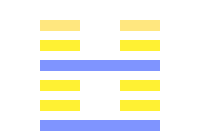
51.1.2.3.4.5 (51 > 48) - THE KĂN HEXAGRAM.
- 1. The first line, undivided, shows its subject, when the movement approaches, looking out and around with apprehension, and afterwards smiling and talking cheerfully. There will be good fortune.
- 2. The second line, divided, shows its subject, when the movement approaches, in a position of peril. He judges it better to let go the articles (in his possession), and to ascend a very lofty height. There is no occasion for him to pursue after (the things he has let go) ; in seven days he will find them.
- 3. The third line, divided, shows its subject distraught amid the startling movements going on. If those movements excite him to (right) action, there will be no mistake.
- 4. The fourth line, undivided, shows its subject, amid the startling movements, supinely sinking (deeper) in the mud.
- 5. The fifth line, divided, shows its subject going and coming amidst the startling movements (of the time), and always in peril ; but perhaps he will not incur loss, and find business (which he can accomplish).
51.1.2.3.4.5 (51 > 48) - Shock
One is proud to be able to tell others why one should do it like this.
Bing DeepL Google Yandex51.1.2.3.4.5 (51 > 48) - Shock
One is proud to be able to tell others why one should do it like this.
Bing DeepL Google Yandex51.1.2.3.4.5 (51 > 48) - Kán, l’ébranlement
Kán : tonnerre, effroi répandu, crainte.
- 1. Le tonnerre approchant, on est plein d’effroi ; puis, quand il est passé, on sourit et on parle tous ensemble (on passe de la crainte à la joie).
- 2. Quand le tonnerre gronde, le danger arrive, on croit devoir tout abandonner et se retirer en un lieu sûr et élevé. Qu’on ne s’obstine pas à rechercher alors ce qu’on a abandonné ; on le retrouvera quelque temps après. (Quand le danger sera passé.)
- 3. Le tonnerre émeut, agite ; il pousse à agir justement.
- 4. Le tonnerre approchant trouble et interdit [avant même l’éclair].
- 5. Le tonnerre allant et venant répand l’effroi ; mais on doit tâcher de ne pas abandonner les affaires entreprises. Même dans le danger pressant, on doit garder le milieu.
51.1.2.3.4.5 (51 > 48) - Le choc
On est fier de pouvoir dire aux autres pourquoi il faut faire comme ça.
Bing DeepL Google Yandex51.1.2.3.4.5 (51 > 48) - Megrázkódtatás
- 1. Nevethet miután meglátja.
- 2. Ne keresse ami elveszett.
- 3. Meglátva a szakadást otthagyja őket.
- 4. Meg kell szabadítania magát a többiektől mielőtt tovább mehetne.
- 5. Szilárdan áll a megrázkódtatás kezdetekor és végigkíséri a többieket míg véget nem ér.
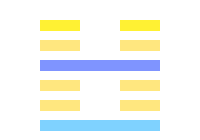
51.4.6 (51 > 27) - THE KĂN HEXAGRAM.
- 4. The fourth line, undivided, shows its subject, amid the startling movements, supinely sinking (deeper) in the mud.
- 6. The topmost line, divided, shows its subject, amidst the startling movements (of the time), in breathless dismay and looking round him with trembling apprehension. If he take action, there will be evil. If, while the startling movements have not reached his own person and his neighbourhood, (he were to take precautions), there would be no error, though his relatives might (still) speak against him.
51.4.6 (51 > 27) - Shock
One asks others what one cannot provide by oneself.
Bing DeepL Google Yandex51.4.6 (51 > 27) - Shock
One asks others what one cannot provide by oneself.
Bing DeepL Google Yandex51.4.6 (51 > 27) - Kán, l’ébranlement
Kán : tonnerre, effroi répandu, crainte.
- 4. Le tonnerre approchant trouble et interdit [avant même l’éclair].
-
6. Le tonnerre répand l’effroi et fait partout regarder avec trouble et crainte. S’il atteint et frappe, il causera un grand mal. (Ou : il corrige le mal.) Mais s’il ne frappe ni tel personnage, ni ses voisins, ce ne sera point un mal et fera seulement jaser les habitants d’une même maison.
Quand le tonnerre gronde, que l’orage éclate, le sage recherche la cause de ce fait (et tâche de profiter de l’avertissement céleste).
51.4.6 (51 > 27) - Le choc
On demande aux autres ce qu'on ne peut pas fournir soi-même.
Bing DeepL Google Yandex51.4.6 (51 > 27) - Megrázkódtatás
- 4. Meg kell szabadítania magát a többiektől mielőtt tovább mehetne.
- 6. Elvesztette a leggyengébbet, visszafogottnak kell maradnia míg nem változnak.
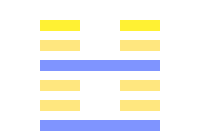
51.1.4.6 (51 > 23) - THE KĂN HEXAGRAM.
- 1. The first line, undivided, shows its subject, when the movement approaches, looking out and around with apprehension, and afterwards smiling and talking cheerfully. There will be good fortune.
- 4. The fourth line, undivided, shows its subject, amid the startling movements, supinely sinking (deeper) in the mud.
- 6. The topmost line, divided, shows its subject, amidst the startling movements (of the time), in breathless dismay and looking round him with trembling apprehension. If he take action, there will be evil. If, while the startling movements have not reached his own person and his neighbourhood, (he were to take precautions), there would be no error, though his relatives might (still) speak against him.
51.1.4.6 (51 > 23) - Shock
One consults the archives to find a lost document.
Bing DeepL Google Yandex51.1.4.6 (51 > 23) - Shock
One consults the archives to find a lost document.
Bing DeepL Google Yandex51.1.4.6 (51 > 23) - Kán, l’ébranlement
Kán : tonnerre, effroi répandu, crainte.
- 1. Le tonnerre approchant, on est plein d’effroi ; puis, quand il est passé, on sourit et on parle tous ensemble (on passe de la crainte à la joie).
- 4. Le tonnerre approchant trouble et interdit [avant même l’éclair].
-
6. Le tonnerre répand l’effroi et fait partout regarder avec trouble et crainte. S’il atteint et frappe, il causera un grand mal. (Ou : il corrige le mal.) Mais s’il ne frappe ni tel personnage, ni ses voisins, ce ne sera point un mal et fera seulement jaser les habitants d’une même maison.
Quand le tonnerre gronde, que l’orage éclate, le sage recherche la cause de ce fait (et tâche de profiter de l’avertissement céleste).
51.1.4.6 (51 > 23) - Le choc
On consulte les archives pour retrouver un document perdu.
Bing DeepL Google Yandex51.1.4.6 (51 > 23) - Megrázkódtatás
- 1. Nevethet miután meglátja.
- 4. Meg kell szabadítania magát a többiektől mielőtt tovább mehetne.
- 6. Elvesztette a leggyengébbet, visszafogottnak kell maradnia míg nem változnak.
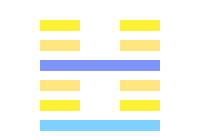
51.2.4.6 (51 > 41) - THE KĂN HEXAGRAM.
- 2. The second line, divided, shows its subject, when the movement approaches, in a position of peril. He judges it better to let go the articles (in his possession), and to ascend a very lofty height. There is no occasion for him to pursue after (the things he has let go) ; in seven days he will find them.
- 4. The fourth line, undivided, shows its subject, amid the startling movements, supinely sinking (deeper) in the mud.
- 6. The topmost line, divided, shows its subject, amidst the startling movements (of the time), in breathless dismay and looking round him with trembling apprehension. If he take action, there will be evil. If, while the startling movements have not reached his own person and his neighbourhood, (he were to take precautions), there would be no error, though his relatives might (still) speak against him.
51.2.4.6 (51 > 41) - Shock
One tries to catch the others off guard but they rejoice and respond in a scathing way.
Bing DeepL Google Yandex51.2.4.6 (51 > 41) - Shock
One tries to catch the others off guard but they rejoice and respond in a scathing way.
Bing DeepL Google Yandex51.2.4.6 (51 > 41) - Kán, l’ébranlement
Kán : tonnerre, effroi répandu, crainte.
- 2. Quand le tonnerre gronde, le danger arrive, on croit devoir tout abandonner et se retirer en un lieu sûr et élevé. Qu’on ne s’obstine pas à rechercher alors ce qu’on a abandonné ; on le retrouvera quelque temps après. (Quand le danger sera passé.)
- 4. Le tonnerre approchant trouble et interdit [avant même l’éclair].
-
6. Le tonnerre répand l’effroi et fait partout regarder avec trouble et crainte. S’il atteint et frappe, il causera un grand mal. (Ou : il corrige le mal.) Mais s’il ne frappe ni tel personnage, ni ses voisins, ce ne sera point un mal et fera seulement jaser les habitants d’une même maison.
Quand le tonnerre gronde, que l’orage éclate, le sage recherche la cause de ce fait (et tâche de profiter de l’avertissement céleste).
51.2.4.6 (51 > 41) - Le choc
On tente de prendre les autres de court mais ceux-ci se réjouissent et répliquent d'une façon cinglante.
Bing DeepL Google Yandex51.2.4.6 (51 > 41) - Megrázkódtatás
- 2. Ne keresse ami elveszett.
- 4. Meg kell szabadítania magát a többiektől mielőtt tovább mehetne.
- 6. Elvesztette a leggyengébbet, visszafogottnak kell maradnia míg nem változnak.
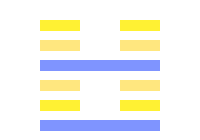
51.1.2.4.6 (51 > 4) - THE KĂN HEXAGRAM.
- 1. The first line, undivided, shows its subject, when the movement approaches, looking out and around with apprehension, and afterwards smiling and talking cheerfully. There will be good fortune.
- 2. The second line, divided, shows its subject, when the movement approaches, in a position of peril. He judges it better to let go the articles (in his possession), and to ascend a very lofty height. There is no occasion for him to pursue after (the things he has let go) ; in seven days he will find them.
- 4. The fourth line, undivided, shows its subject, amid the startling movements, supinely sinking (deeper) in the mud.
- 6. The topmost line, divided, shows its subject, amidst the startling movements (of the time), in breathless dismay and looking round him with trembling apprehension. If he take action, there will be evil. If, while the startling movements have not reached his own person and his neighbourhood, (he were to take precautions), there would be no error, though his relatives might (still) speak against him.
51.1.2.4.6 (51 > 4) - Kán, l’ébranlement
Kán : tonnerre, effroi répandu, crainte.
- 1. Le tonnerre approchant, on est plein d’effroi ; puis, quand il est passé, on sourit et on parle tous ensemble (on passe de la crainte à la joie).
- 2. Quand le tonnerre gronde, le danger arrive, on croit devoir tout abandonner et se retirer en un lieu sûr et élevé. Qu’on ne s’obstine pas à rechercher alors ce qu’on a abandonné ; on le retrouvera quelque temps après. (Quand le danger sera passé.)
- 4. Le tonnerre approchant trouble et interdit [avant même l’éclair].
-
6. Le tonnerre répand l’effroi et fait partout regarder avec trouble et crainte. S’il atteint et frappe, il causera un grand mal. (Ou : il corrige le mal.) Mais s’il ne frappe ni tel personnage, ni ses voisins, ce ne sera point un mal et fera seulement jaser les habitants d’une même maison.
Quand le tonnerre gronde, que l’orage éclate, le sage recherche la cause de ce fait (et tâche de profiter de l’avertissement céleste).
51.1.2.4.6 (51 > 4) - Megrázkódtatás
- 1. Nevethet miután meglátja.
- 2. Ne keresse ami elveszett.
- 4. Meg kell szabadítania magát a többiektől mielőtt tovább mehetne.
- 6. Elvesztette a leggyengébbet, visszafogottnak kell maradnia míg nem változnak.
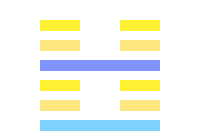
51.3.4.6 (51 > 22) - THE KĂN HEXAGRAM.
- 3. The third line, divided, shows its subject distraught amid the startling movements going on. If those movements excite him to (right) action, there will be no mistake.
- 4. The fourth line, undivided, shows its subject, amid the startling movements, supinely sinking (deeper) in the mud.
- 6. The topmost line, divided, shows its subject, amidst the startling movements (of the time), in breathless dismay and looking round him with trembling apprehension. If he take action, there will be evil. If, while the startling movements have not reached his own person and his neighbourhood, (he were to take precautions), there would be no error, though his relatives might (still) speak against him.
51.3.4.6 (51 > 22) - Shock
One weighs one' s words before making comments that can be humiliating for one' s interlocutors.
Bing DeepL Google Yandex51.3.4.6 (51 > 22) - Shock
One weighs one' s words before making comments that can be humiliating for one' s interlocutors.
Bing DeepL Google Yandex51.3.4.6 (51 > 22) - Kán, l’ébranlement
Kán : tonnerre, effroi répandu, crainte.
- 3. Le tonnerre émeut, agite ; il pousse à agir justement.
- 4. Le tonnerre approchant trouble et interdit [avant même l’éclair].
-
6. Le tonnerre répand l’effroi et fait partout regarder avec trouble et crainte. S’il atteint et frappe, il causera un grand mal. (Ou : il corrige le mal.) Mais s’il ne frappe ni tel personnage, ni ses voisins, ce ne sera point un mal et fera seulement jaser les habitants d’une même maison.
Quand le tonnerre gronde, que l’orage éclate, le sage recherche la cause de ce fait (et tâche de profiter de l’avertissement céleste).
51.3.4.6 (51 > 22) - Le choc
On pèse ses mots avant de tenir des propos qui peuvent être humiliants pour ses interlocuteurs.
Bing DeepL Google Yandex51.3.4.6 (51 > 22) - Megrázkódtatás
- 3. Meglátva a szakadást otthagyja őket.
- 4. Meg kell szabadítania magát a többiektől mielőtt tovább mehetne.
- 6. Elvesztette a leggyengébbet, visszafogottnak kell maradnia míg nem változnak.
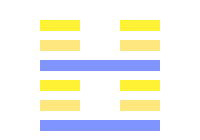
51.1.3.4.6 (51 > 52) - THE KĂN HEXAGRAM.
- 1. The first line, undivided, shows its subject, when the movement approaches, looking out and around with apprehension, and afterwards smiling and talking cheerfully. There will be good fortune.
- 3. The third line, divided, shows its subject distraught amid the startling movements going on. If those movements excite him to (right) action, there will be no mistake.
- 4. The fourth line, undivided, shows its subject, amid the startling movements, supinely sinking (deeper) in the mud.
- 6. The topmost line, divided, shows its subject, amidst the startling movements (of the time), in breathless dismay and looking round him with trembling apprehension. If he take action, there will be evil. If, while the startling movements have not reached his own person and his neighbourhood, (he were to take precautions), there would be no error, though his relatives might (still) speak against him.
51.1.3.4.6 (51 > 52) - Shock
One indulges in shenanigans so as not to be regarded as all and sundry.
Bing DeepL Google Yandex51.1.3.4.6 (51 > 52) - Shock
One indulges in shenanigans so as not to be regarded as all and sundry.
Bing DeepL Google Yandex51.1.3.4.6 (51 > 52) - Kán, l’ébranlement
Kán : tonnerre, effroi répandu, crainte.
- 1. Le tonnerre approchant, on est plein d’effroi ; puis, quand il est passé, on sourit et on parle tous ensemble (on passe de la crainte à la joie).
- 3. Le tonnerre émeut, agite ; il pousse à agir justement.
- 4. Le tonnerre approchant trouble et interdit [avant même l’éclair].
-
6. Le tonnerre répand l’effroi et fait partout regarder avec trouble et crainte. S’il atteint et frappe, il causera un grand mal. (Ou : il corrige le mal.) Mais s’il ne frappe ni tel personnage, ni ses voisins, ce ne sera point un mal et fera seulement jaser les habitants d’une même maison.
Quand le tonnerre gronde, que l’orage éclate, le sage recherche la cause de ce fait (et tâche de profiter de l’avertissement céleste).
51.1.3.4.6 (51 > 52) - Le choc
On se complaît à faire des frasques pour ne pas être considéré comme le tout-venant.
Bing DeepL Google Yandex51.1.3.4.6 (51 > 52) - Megrázkódtatás
- 1. Nevethet miután meglátja.
- 3. Meglátva a szakadást otthagyja őket.
- 4. Meg kell szabadítania magát a többiektől mielőtt tovább mehetne.
- 6. Elvesztette a leggyengébbet, visszafogottnak kell maradnia míg nem változnak.
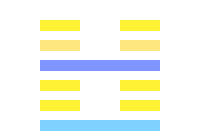
51.2.3.4.6 (51 > 26) - THE KĂN HEXAGRAM.
- 2. The second line, divided, shows its subject, when the movement approaches, in a position of peril. He judges it better to let go the articles (in his possession), and to ascend a very lofty height. There is no occasion for him to pursue after (the things he has let go) ; in seven days he will find them.
- 3. The third line, divided, shows its subject distraught amid the startling movements going on. If those movements excite him to (right) action, there will be no mistake.
- 4. The fourth line, undivided, shows its subject, amid the startling movements, supinely sinking (deeper) in the mud.
- 6. The topmost line, divided, shows its subject, amidst the startling movements (of the time), in breathless dismay and looking round him with trembling apprehension. If he take action, there will be evil. If, while the startling movements have not reached his own person and his neighbourhood, (he were to take precautions), there would be no error, though his relatives might (still) speak against him.
51.2.3.4.6 (51 > 26) - Shock
One tumbles preconceived ideas by ending one's sentences abruptly.
Bing DeepL Google Yandex51.2.3.4.6 (51 > 26) - Shock
One tumbles preconceived ideas by ending one's sentences abruptly.
Bing DeepL Google Yandex51.2.3.4.6 (51 > 26) - Kán, l’ébranlement
Kán : tonnerre, effroi répandu, crainte.
- 2. Quand le tonnerre gronde, le danger arrive, on croit devoir tout abandonner et se retirer en un lieu sûr et élevé. Qu’on ne s’obstine pas à rechercher alors ce qu’on a abandonné ; on le retrouvera quelque temps après. (Quand le danger sera passé.)
- 3. Le tonnerre émeut, agite ; il pousse à agir justement.
- 4. Le tonnerre approchant trouble et interdit [avant même l’éclair].
-
6. Le tonnerre répand l’effroi et fait partout regarder avec trouble et crainte. S’il atteint et frappe, il causera un grand mal. (Ou : il corrige le mal.) Mais s’il ne frappe ni tel personnage, ni ses voisins, ce ne sera point un mal et fera seulement jaser les habitants d’une même maison.
Quand le tonnerre gronde, que l’orage éclate, le sage recherche la cause de ce fait (et tâche de profiter de l’avertissement céleste).
51.2.3.4.6 (51 > 26) - Le choc
On culbute les idées préconçues en terminant ses phrases de façon abrupte.
Bing DeepL Google Yandex51.2.3.4.6 (51 > 26) - Megrázkódtatás
- 2. Ne keresse ami elveszett.
- 3. Meglátva a szakadást otthagyja őket.
- 4. Meg kell szabadítania magát a többiektől mielőtt tovább mehetne.
- 6. Elvesztette a leggyengébbet, visszafogottnak kell maradnia míg nem változnak.
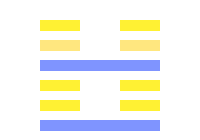
51.1.2.3.4.6 (51 > 18) - THE KĂN HEXAGRAM.
- 1. The first line, undivided, shows its subject, when the movement approaches, looking out and around with apprehension, and afterwards smiling and talking cheerfully. There will be good fortune.
- 2. The second line, divided, shows its subject, when the movement approaches, in a position of peril. He judges it better to let go the articles (in his possession), and to ascend a very lofty height. There is no occasion for him to pursue after (the things he has let go) ; in seven days he will find them.
- 3. The third line, divided, shows its subject distraught amid the startling movements going on. If those movements excite him to (right) action, there will be no mistake.
- 4. The fourth line, undivided, shows its subject, amid the startling movements, supinely sinking (deeper) in the mud.
- 6. The topmost line, divided, shows its subject, amidst the startling movements (of the time), in breathless dismay and looking round him with trembling apprehension. If he take action, there will be evil. If, while the startling movements have not reached his own person and his neighbourhood, (he were to take precautions), there would be no error, though his relatives might (still) speak against him.
51.1.2.3.4.6 (51 > 18) - Shock
One extends one's study to related fields in order to understand how the whole thing works.
Bing DeepL Google Yandex51.1.2.3.4.6 (51 > 18) - Shock
One extends one's study to related fields in order to understand how the whole thing works.
Bing DeepL Google Yandex51.1.2.3.4.6 (51 > 18) - Kán, l’ébranlement
Kán : tonnerre, effroi répandu, crainte.
- 1. Le tonnerre approchant, on est plein d’effroi ; puis, quand il est passé, on sourit et on parle tous ensemble (on passe de la crainte à la joie).
- 2. Quand le tonnerre gronde, le danger arrive, on croit devoir tout abandonner et se retirer en un lieu sûr et élevé. Qu’on ne s’obstine pas à rechercher alors ce qu’on a abandonné ; on le retrouvera quelque temps après. (Quand le danger sera passé.)
- 3. Le tonnerre émeut, agite ; il pousse à agir justement.
- 4. Le tonnerre approchant trouble et interdit [avant même l’éclair].
-
6. Le tonnerre répand l’effroi et fait partout regarder avec trouble et crainte. S’il atteint et frappe, il causera un grand mal. (Ou : il corrige le mal.) Mais s’il ne frappe ni tel personnage, ni ses voisins, ce ne sera point un mal et fera seulement jaser les habitants d’une même maison.
Quand le tonnerre gronde, que l’orage éclate, le sage recherche la cause de ce fait (et tâche de profiter de l’avertissement céleste).
51.1.2.3.4.6 (51 > 18) - Le choc
On étend son étude à des domaines connexes afin de parvenir à comprendre le fonctionnement de l'ensemble.
Bing DeepL Google Yandex51.1.2.3.4.6 (51 > 18) - Megrázkódtatás
- 1. Nevethet miután meglátja.
- 2. Ne keresse ami elveszett.
- 3. Meglátva a szakadást otthagyja őket.
- 4. Meg kell szabadítania magát a többiektől mielőtt tovább mehetne.
- 6. Elvesztette a leggyengébbet, visszafogottnak kell maradnia míg nem változnak.
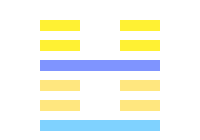
51.4.5.6 (51 > 42) - THE KĂN HEXAGRAM.
- 4. The fourth line, undivided, shows its subject, amid the startling movements, supinely sinking (deeper) in the mud.
- 5. The fifth line, divided, shows its subject going and coming amidst the startling movements (of the time), and always in peril ; but perhaps he will not incur loss, and find business (which he can accomplish).
- 6. The topmost line, divided, shows its subject, amidst the startling movements (of the time), in breathless dismay and looking round him with trembling apprehension. If he take action, there will be evil. If, while the startling movements have not reached his own person and his neighbourhood, (he were to take precautions), there would be no error, though his relatives might (still) speak against him.
51.4.5.6 (51 > 42) - Shock
One complicates the situation to keep the audience on their toes.
Bing DeepL Google Yandex51.4.5.6 (51 > 42) - Shock
One complicates the situation to keep the audience on their toes.
Bing DeepL Google Yandex51.4.5.6 (51 > 42) - Kán, l’ébranlement
Kán : tonnerre, effroi répandu, crainte.
- 4. Le tonnerre approchant trouble et interdit [avant même l’éclair].
- 5. Le tonnerre allant et venant répand l’effroi ; mais on doit tâcher de ne pas abandonner les affaires entreprises. Même dans le danger pressant, on doit garder le milieu.
-
6. Le tonnerre répand l’effroi et fait partout regarder avec trouble et crainte. S’il atteint et frappe, il causera un grand mal. (Ou : il corrige le mal.) Mais s’il ne frappe ni tel personnage, ni ses voisins, ce ne sera point un mal et fera seulement jaser les habitants d’une même maison.
Quand le tonnerre gronde, que l’orage éclate, le sage recherche la cause de ce fait (et tâche de profiter de l’avertissement céleste).
51.4.5.6 (51 > 42) - Le choc
On complique la situation pour tenir son public en haleine.
Bing DeepL Google Yandex51.4.5.6 (51 > 42) - Megrázkódtatás
- 4. Meg kell szabadítania magát a többiektől mielőtt tovább mehetne.
- 5. Szilárdan áll a megrázkódtatás kezdetekor és végigkíséri a többieket míg véget nem ér.
- 6. Elvesztette a leggyengébbet, visszafogottnak kell maradnia míg nem változnak.
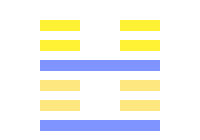
51.1.4.5.6 (51 > 20) - THE KĂN HEXAGRAM.
- 1. The first line, undivided, shows its subject, when the movement approaches, looking out and around with apprehension, and afterwards smiling and talking cheerfully. There will be good fortune.
- 4. The fourth line, undivided, shows its subject, amid the startling movements, supinely sinking (deeper) in the mud.
- 5. The fifth line, divided, shows its subject going and coming amidst the startling movements (of the time), and always in peril ; but perhaps he will not incur loss, and find business (which he can accomplish).
- 6. The topmost line, divided, shows its subject, amidst the startling movements (of the time), in breathless dismay and looking round him with trembling apprehension. If he take action, there will be evil. If, while the startling movements have not reached his own person and his neighbourhood, (he were to take precautions), there would be no error, though his relatives might (still) speak against him.
51.1.4.5.6 (51 > 20) - Shock
One imagines seeing things that others cannot understand.
Bing DeepL Google Yandex51.1.4.5.6 (51 > 20) - Shock
One imagines seeing things that others cannot understand.
Bing DeepL Google Yandex51.1.4.5.6 (51 > 20) - Kán, l’ébranlement
Kán : tonnerre, effroi répandu, crainte.
- 1. Le tonnerre approchant, on est plein d’effroi ; puis, quand il est passé, on sourit et on parle tous ensemble (on passe de la crainte à la joie).
- 4. Le tonnerre approchant trouble et interdit [avant même l’éclair].
- 5. Le tonnerre allant et venant répand l’effroi ; mais on doit tâcher de ne pas abandonner les affaires entreprises. Même dans le danger pressant, on doit garder le milieu.
-
6. Le tonnerre répand l’effroi et fait partout regarder avec trouble et crainte. S’il atteint et frappe, il causera un grand mal. (Ou : il corrige le mal.) Mais s’il ne frappe ni tel personnage, ni ses voisins, ce ne sera point un mal et fera seulement jaser les habitants d’une même maison.
Quand le tonnerre gronde, que l’orage éclate, le sage recherche la cause de ce fait (et tâche de profiter de l’avertissement céleste).
51.1.4.5.6 (51 > 20) - Le choc
On imagine voir des choses que les autres ne peuvent pas comprendre.
Bing DeepL Google Yandex51.1.4.5.6 (51 > 20) - Megrázkódtatás
- 1. Nevethet miután meglátja.
- 4. Meg kell szabadítania magát a többiektől mielőtt tovább mehetne.
- 5. Szilárdan áll a megrázkódtatás kezdetekor és végigkíséri a többieket míg véget nem ér.
- 6. Elvesztette a leggyengébbet, visszafogottnak kell maradnia míg nem változnak.
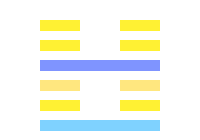
51.2.4.5.6 (51 > 61) - THE KĂN HEXAGRAM.
- 2. The second line, divided, shows its subject, when the movement approaches, in a position of peril. He judges it better to let go the articles (in his possession), and to ascend a very lofty height. There is no occasion for him to pursue after (the things he has let go) ; in seven days he will find them.
- 4. The fourth line, undivided, shows its subject, amid the startling movements, supinely sinking (deeper) in the mud.
- 5. The fifth line, divided, shows its subject going and coming amidst the startling movements (of the time), and always in peril ; but perhaps he will not incur loss, and find business (which he can accomplish).
- 6. The topmost line, divided, shows its subject, amidst the startling movements (of the time), in breathless dismay and looking round him with trembling apprehension. If he take action, there will be evil. If, while the startling movements have not reached his own person and his neighbourhood, (he were to take precautions), there would be no error, though his relatives might (still) speak against him.
51.2.4.5.6 (51 > 61) - Shock
One says that others have never had the slightest opportunity to do what one came for.
Bing DeepL Google Yandex51.2.4.5.6 (51 > 61) - Shock
One says that others have never had the slightest opportunity to do what one came for.
Bing DeepL Google Yandex51.2.4.5.6 (51 > 61) - Kán, l’ébranlement
Kán : tonnerre, effroi répandu, crainte.
- 2. Quand le tonnerre gronde, le danger arrive, on croit devoir tout abandonner et se retirer en un lieu sûr et élevé. Qu’on ne s’obstine pas à rechercher alors ce qu’on a abandonné ; on le retrouvera quelque temps après. (Quand le danger sera passé.)
- 4. Le tonnerre approchant trouble et interdit [avant même l’éclair].
- 5. Le tonnerre allant et venant répand l’effroi ; mais on doit tâcher de ne pas abandonner les affaires entreprises. Même dans le danger pressant, on doit garder le milieu.
-
6. Le tonnerre répand l’effroi et fait partout regarder avec trouble et crainte. S’il atteint et frappe, il causera un grand mal. (Ou : il corrige le mal.) Mais s’il ne frappe ni tel personnage, ni ses voisins, ce ne sera point un mal et fera seulement jaser les habitants d’une même maison.
Quand le tonnerre gronde, que l’orage éclate, le sage recherche la cause de ce fait (et tâche de profiter de l’avertissement céleste).
51.2.4.5.6 (51 > 61) - Le choc
On raconte que les autres n'ont jamais eu la moindre occasion de faire ce pour quoi on est venu.
Bing DeepL Google Yandex51.2.4.5.6 (51 > 61) - Megrázkódtatás
- 2. Ne keresse ami elveszett.
- 4. Meg kell szabadítania magát a többiektől mielőtt tovább mehetne.
- 5. Szilárdan áll a megrázkódtatás kezdetekor és végigkíséri a többieket míg véget nem ér.
- 6. Elvesztette a leggyengébbet, visszafogottnak kell maradnia míg nem változnak.
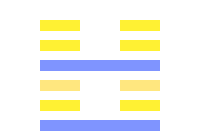
51.1.2.4.5.6 (51 > 59) - THE KĂN HEXAGRAM.
- 1. The first line, undivided, shows its subject, when the movement approaches, looking out and around with apprehension, and afterwards smiling and talking cheerfully. There will be good fortune.
- 2. The second line, divided, shows its subject, when the movement approaches, in a position of peril. He judges it better to let go the articles (in his possession), and to ascend a very lofty height. There is no occasion for him to pursue after (the things he has let go) ; in seven days he will find them.
- 4. The fourth line, undivided, shows its subject, amid the startling movements, supinely sinking (deeper) in the mud.
- 5. The fifth line, divided, shows its subject going and coming amidst the startling movements (of the time), and always in peril ; but perhaps he will not incur loss, and find business (which he can accomplish).
- 6. The topmost line, divided, shows its subject, amidst the startling movements (of the time), in breathless dismay and looking round him with trembling apprehension. If he take action, there will be evil. If, while the startling movements have not reached his own person and his neighbourhood, (he were to take precautions), there would be no error, though his relatives might (still) speak against him.
51.1.2.4.5.6 (51 > 59) - Shock
One carefully weighs the chances of being able to reach one's goal without any resistance.
Bing DeepL Google Yandex51.1.2.4.5.6 (51 > 59) - Shock
One carefully weighs the chances of being able to reach one's goal without any resistance.
Bing DeepL Google Yandex51.1.2.4.5.6 (51 > 59) - Kán, l’ébranlement
Kán : tonnerre, effroi répandu, crainte.
- 1. Le tonnerre approchant, on est plein d’effroi ; puis, quand il est passé, on sourit et on parle tous ensemble (on passe de la crainte à la joie).
- 2. Quand le tonnerre gronde, le danger arrive, on croit devoir tout abandonner et se retirer en un lieu sûr et élevé. Qu’on ne s’obstine pas à rechercher alors ce qu’on a abandonné ; on le retrouvera quelque temps après. (Quand le danger sera passé.)
- 4. Le tonnerre approchant trouble et interdit [avant même l’éclair].
- 5. Le tonnerre allant et venant répand l’effroi ; mais on doit tâcher de ne pas abandonner les affaires entreprises. Même dans le danger pressant, on doit garder le milieu.
-
6. Le tonnerre répand l’effroi et fait partout regarder avec trouble et crainte. S’il atteint et frappe, il causera un grand mal. (Ou : il corrige le mal.) Mais s’il ne frappe ni tel personnage, ni ses voisins, ce ne sera point un mal et fera seulement jaser les habitants d’une même maison.
Quand le tonnerre gronde, que l’orage éclate, le sage recherche la cause de ce fait (et tâche de profiter de l’avertissement céleste).
51.1.2.4.5.6 (51 > 59) - Le choc
On soupèse attentivement les chances que l'on aurait de pouvoir atteindre son but sans se voir opposer la moindre résistance.
Bing DeepL Google Yandex51.1.2.4.5.6 (51 > 59) - Megrázkódtatás
- 1. Nevethet miután meglátja.
- 2. Ne keresse ami elveszett.
- 4. Meg kell szabadítania magát a többiektől mielőtt tovább mehetne.
- 5. Szilárdan áll a megrázkódtatás kezdetekor és végigkíséri a többieket míg véget nem ér.
- 6. Elvesztette a leggyengébbet, visszafogottnak kell maradnia míg nem változnak.
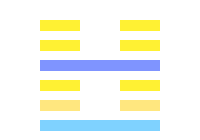
51.3.4.5.6 (51 > 37) - THE KĂN HEXAGRAM.
- 3. The third line, divided, shows its subject distraught amid the startling movements going on. If those movements excite him to (right) action, there will be no mistake.
- 4. The fourth line, undivided, shows its subject, amid the startling movements, supinely sinking (deeper) in the mud.
- 5. The fifth line, divided, shows its subject going and coming amidst the startling movements (of the time), and always in peril ; but perhaps he will not incur loss, and find business (which he can accomplish).
- 6. The topmost line, divided, shows its subject, amidst the startling movements (of the time), in breathless dismay and looking round him with trembling apprehension. If he take action, there will be evil. If, while the startling movements have not reached his own person and his neighbourhood, (he were to take precautions), there would be no error, though his relatives might (still) speak against him.
51.3.4.5.6 (51 > 37) - Shock
One fills out a form to obtain special rights.
Bing DeepL Google Yandex51.3.4.5.6 (51 > 37) - Shock
One fills out a form to obtain special rights.
Bing DeepL Google Yandex51.3.4.5.6 (51 > 37) - Kán, l’ébranlement
Kán : tonnerre, effroi répandu, crainte.
- 3. Le tonnerre émeut, agite ; il pousse à agir justement.
- 4. Le tonnerre approchant trouble et interdit [avant même l’éclair].
- 5. Le tonnerre allant et venant répand l’effroi ; mais on doit tâcher de ne pas abandonner les affaires entreprises. Même dans le danger pressant, on doit garder le milieu.
-
6. Le tonnerre répand l’effroi et fait partout regarder avec trouble et crainte. S’il atteint et frappe, il causera un grand mal. (Ou : il corrige le mal.) Mais s’il ne frappe ni tel personnage, ni ses voisins, ce ne sera point un mal et fera seulement jaser les habitants d’une même maison.
Quand le tonnerre gronde, que l’orage éclate, le sage recherche la cause de ce fait (et tâche de profiter de l’avertissement céleste).
51.3.4.5.6 (51 > 37) - Le choc
On remplit un formulaire pour obtenir des droits spéciaux.
Bing DeepL Google Yandex51.3.4.5.6 (51 > 37) - Megrázkódtatás
- 3. Meglátva a szakadást otthagyja őket.
- 4. Meg kell szabadítania magát a többiektől mielőtt tovább mehetne.
- 5. Szilárdan áll a megrázkódtatás kezdetekor és végigkíséri a többieket míg véget nem ér.
- 6. Elvesztette a leggyengébbet, visszafogottnak kell maradnia míg nem változnak.
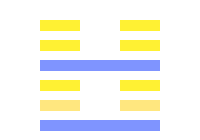
51.1.3.4.5.6 (51 > 53) - THE KĂN HEXAGRAM.
- 1. The first line, undivided, shows its subject, when the movement approaches, looking out and around with apprehension, and afterwards smiling and talking cheerfully. There will be good fortune.
- 3. The third line, divided, shows its subject distraught amid the startling movements going on. If those movements excite him to (right) action, there will be no mistake.
- 4. The fourth line, undivided, shows its subject, amid the startling movements, supinely sinking (deeper) in the mud.
- 5. The fifth line, divided, shows its subject going and coming amidst the startling movements (of the time), and always in peril ; but perhaps he will not incur loss, and find business (which he can accomplish).
- 6. The topmost line, divided, shows its subject, amidst the startling movements (of the time), in breathless dismay and looking round him with trembling apprehension. If he take action, there will be evil. If, while the startling movements have not reached his own person and his neighbourhood, (he were to take precautions), there would be no error, though his relatives might (still) speak against him.
51.1.3.4.5.6 (51 > 53) - Shock
One tells one's life to strangers because they don't know who they are dealing with.
Bing DeepL Google Yandex51.1.3.4.5.6 (51 > 53) - Shock
One tells one's life to strangers because they don't know who they are dealing with.
Bing DeepL Google Yandex51.1.3.4.5.6 (51 > 53) - Kán, l’ébranlement
Kán : tonnerre, effroi répandu, crainte.
- 1. Le tonnerre approchant, on est plein d’effroi ; puis, quand il est passé, on sourit et on parle tous ensemble (on passe de la crainte à la joie).
- 3. Le tonnerre émeut, agite ; il pousse à agir justement.
- 4. Le tonnerre approchant trouble et interdit [avant même l’éclair].
- 5. Le tonnerre allant et venant répand l’effroi ; mais on doit tâcher de ne pas abandonner les affaires entreprises. Même dans le danger pressant, on doit garder le milieu.
-
6. Le tonnerre répand l’effroi et fait partout regarder avec trouble et crainte. S’il atteint et frappe, il causera un grand mal. (Ou : il corrige le mal.) Mais s’il ne frappe ni tel personnage, ni ses voisins, ce ne sera point un mal et fera seulement jaser les habitants d’une même maison.
Quand le tonnerre gronde, que l’orage éclate, le sage recherche la cause de ce fait (et tâche de profiter de l’avertissement céleste).
51.1.3.4.5.6 (51 > 53) - Le choc
On raconte sa vie à des inconnus car ils ne savent pas à qui ils ont affaire.
Bing DeepL Google Yandex51.1.3.4.5.6 (51 > 53) - Megrázkódtatás
- 1. Nevethet miután meglátja.
- 3. Meglátva a szakadást otthagyja őket.
- 4. Meg kell szabadítania magát a többiektől mielőtt tovább mehetne.
- 5. Szilárdan áll a megrázkódtatás kezdetekor és végigkíséri a többieket míg véget nem ér.
- 6. Elvesztette a leggyengébbet, visszafogottnak kell maradnia míg nem változnak.
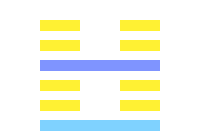
51.2.3.4.5.6 (51 > 9) - THE KĂN HEXAGRAM.
- 2. The second line, divided, shows its subject, when the movement approaches, in a position of peril. He judges it better to let go the articles (in his possession), and to ascend a very lofty height. There is no occasion for him to pursue after (the things he has let go) ; in seven days he will find them.
- 3. The third line, divided, shows its subject distraught amid the startling movements going on. If those movements excite him to (right) action, there will be no mistake.
- 4. The fourth line, undivided, shows its subject, amid the startling movements, supinely sinking (deeper) in the mud.
- 5. The fifth line, divided, shows its subject going and coming amidst the startling movements (of the time), and always in peril ; but perhaps he will not incur loss, and find business (which he can accomplish).
- 6. The topmost line, divided, shows its subject, amidst the startling movements (of the time), in breathless dismay and looking round him with trembling apprehension. If he take action, there will be evil. If, while the startling movements have not reached his own person and his neighbourhood, (he were to take precautions), there would be no error, though his relatives might (still) speak against him.
51.2.3.4.5.6 (51 > 9) - Shock
One shows one's friends what are the difficulties that others have hidden.
Bing DeepL Google Yandex51.2.3.4.5.6 (51 > 9) - Shock
One shows one's friends what are the difficulties that others have hidden.
Bing DeepL Google Yandex51.2.3.4.5.6 (51 > 9) - Kán, l’ébranlement
Kán : tonnerre, effroi répandu, crainte.
- 2. Quand le tonnerre gronde, le danger arrive, on croit devoir tout abandonner et se retirer en un lieu sûr et élevé. Qu’on ne s’obstine pas à rechercher alors ce qu’on a abandonné ; on le retrouvera quelque temps après. (Quand le danger sera passé.)
- 3. Le tonnerre émeut, agite ; il pousse à agir justement.
- 4. Le tonnerre approchant trouble et interdit [avant même l’éclair].
- 5. Le tonnerre allant et venant répand l’effroi ; mais on doit tâcher de ne pas abandonner les affaires entreprises. Même dans le danger pressant, on doit garder le milieu.
-
6. Le tonnerre répand l’effroi et fait partout regarder avec trouble et crainte. S’il atteint et frappe, il causera un grand mal. (Ou : il corrige le mal.) Mais s’il ne frappe ni tel personnage, ni ses voisins, ce ne sera point un mal et fera seulement jaser les habitants d’une même maison.
Quand le tonnerre gronde, que l’orage éclate, le sage recherche la cause de ce fait (et tâche de profiter de l’avertissement céleste).
51.2.3.4.5.6 (51 > 9) - Le choc
On montre à ses amis quelles sont les difficultés que les autres ont dissimulées.
Bing DeepL Google Yandex51.2.3.4.5.6 (51 > 9) - Megrázkódtatás
- 2. Ne keresse ami elveszett.
- 3. Meglátva a szakadást otthagyja őket.
- 4. Meg kell szabadítania magát a többiektől mielőtt tovább mehetne.
- 5. Szilárdan áll a megrázkódtatás kezdetekor és végigkíséri a többieket míg véget nem ér.
- 6. Elvesztette a leggyengébbet, visszafogottnak kell maradnia míg nem változnak.
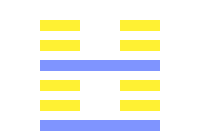
51.1.2.3.4.5.6 (51 > 57) - THE KĂN HEXAGRAM.
- 1. The first line, undivided, shows its subject, when the movement approaches, looking out and around with apprehension, and afterwards smiling and talking cheerfully. There will be good fortune.
- 2. The second line, divided, shows its subject, when the movement approaches, in a position of peril. He judges it better to let go the articles (in his possession), and to ascend a very lofty height. There is no occasion for him to pursue after (the things he has let go) ; in seven days he will find them.
- 3. The third line, divided, shows its subject distraught amid the startling movements going on. If those movements excite him to (right) action, there will be no mistake.
- 4. The fourth line, undivided, shows its subject, amid the startling movements, supinely sinking (deeper) in the mud.
- 5. The fifth line, divided, shows its subject going and coming amidst the startling movements (of the time), and always in peril ; but perhaps he will not incur loss, and find business (which he can accomplish).
- 6. The topmost line, divided, shows its subject, amidst the startling movements (of the time), in breathless dismay and looking round him with trembling apprehension. If he take action, there will be evil. If, while the startling movements have not reached his own person and his neighbourhood, (he were to take precautions), there would be no error, though his relatives might (still) speak against him.
51.1.2.3.4.5.6 (51 > 57) - Shock
One apologises profusely so as not to have to do more chores.
Bing DeepL Google Yandex51.1.2.3.4.5.6 (51 > 57) - Shock
One apologizes profusely so as not to have to do more chores.
Bing DeepL Google Yandex51.1.2.3.4.5.6 (51 > 57) - Kán, l’ébranlement
Kán : tonnerre, effroi répandu, crainte.
- 1. Le tonnerre approchant, on est plein d’effroi ; puis, quand il est passé, on sourit et on parle tous ensemble (on passe de la crainte à la joie).
- 2. Quand le tonnerre gronde, le danger arrive, on croit devoir tout abandonner et se retirer en un lieu sûr et élevé. Qu’on ne s’obstine pas à rechercher alors ce qu’on a abandonné ; on le retrouvera quelque temps après. (Quand le danger sera passé.)
- 3. Le tonnerre émeut, agite ; il pousse à agir justement.
- 4. Le tonnerre approchant trouble et interdit [avant même l’éclair].
- 5. Le tonnerre allant et venant répand l’effroi ; mais on doit tâcher de ne pas abandonner les affaires entreprises. Même dans le danger pressant, on doit garder le milieu.
-
6. Le tonnerre répand l’effroi et fait partout regarder avec trouble et crainte. S’il atteint et frappe, il causera un grand mal. (Ou : il corrige le mal.) Mais s’il ne frappe ni tel personnage, ni ses voisins, ce ne sera point un mal et fera seulement jaser les habitants d’une même maison.
Quand le tonnerre gronde, que l’orage éclate, le sage recherche la cause de ce fait (et tâche de profiter de l’avertissement céleste).
51.1.2.3.4.5.6 (51 > 57) - Le choc
On se répand en excuses pour ne pas avoir à faire davantage de corvées.
Bing DeepL Google Yandex51.1.2.3.4.5.6 (51 > 57) - Megrázkódtatás
- 1. Nevethet miután meglátja.
- 2. Ne keresse ami elveszett.
- 3. Meglátva a szakadást otthagyja őket.
- 4. Meg kell szabadítania magát a többiektől mielőtt tovább mehetne.
- 5. Szilárdan áll a megrázkódtatás kezdetekor és végigkíséri a többieket míg véget nem ér.
- 6. Elvesztette a leggyengébbet, visszafogottnak kell maradnia míg nem változnak.

